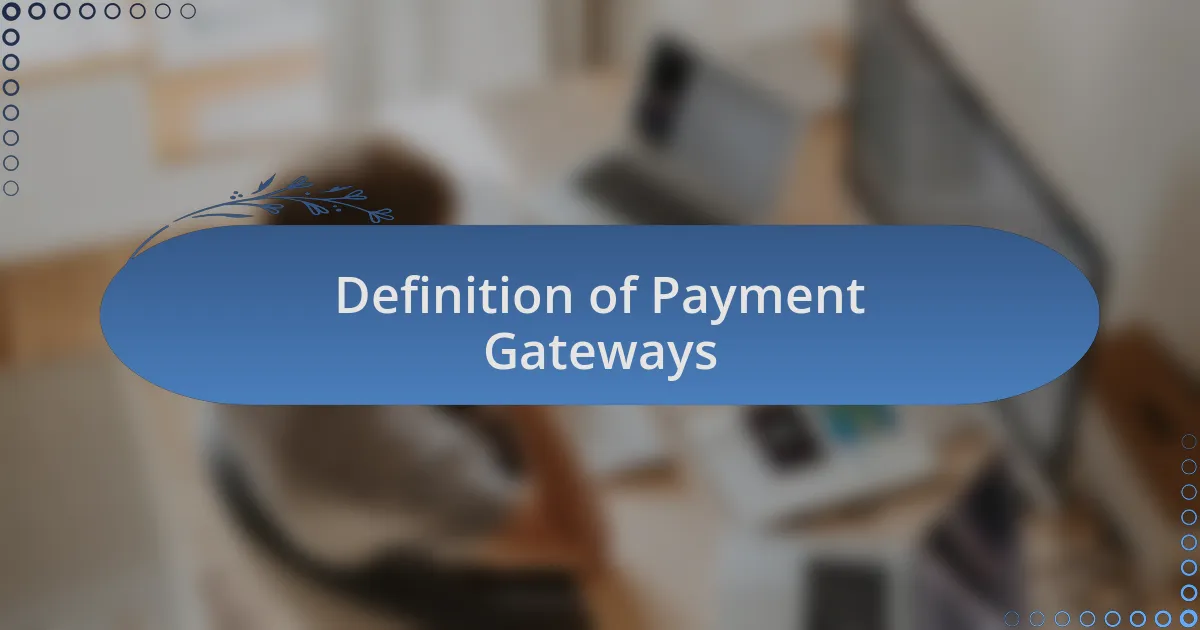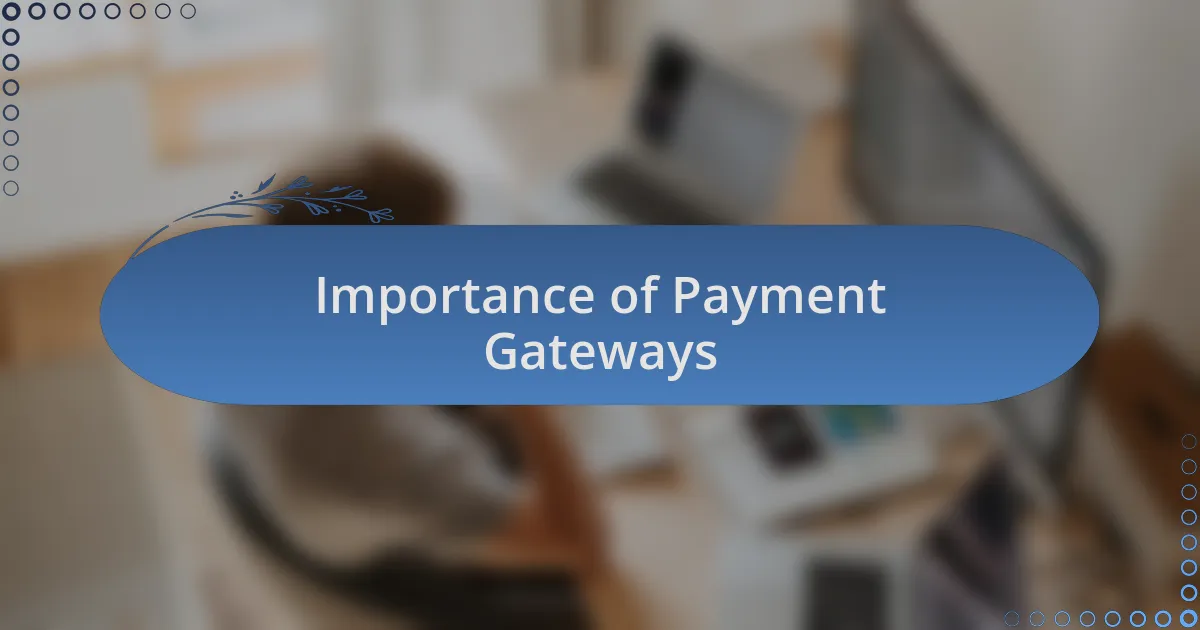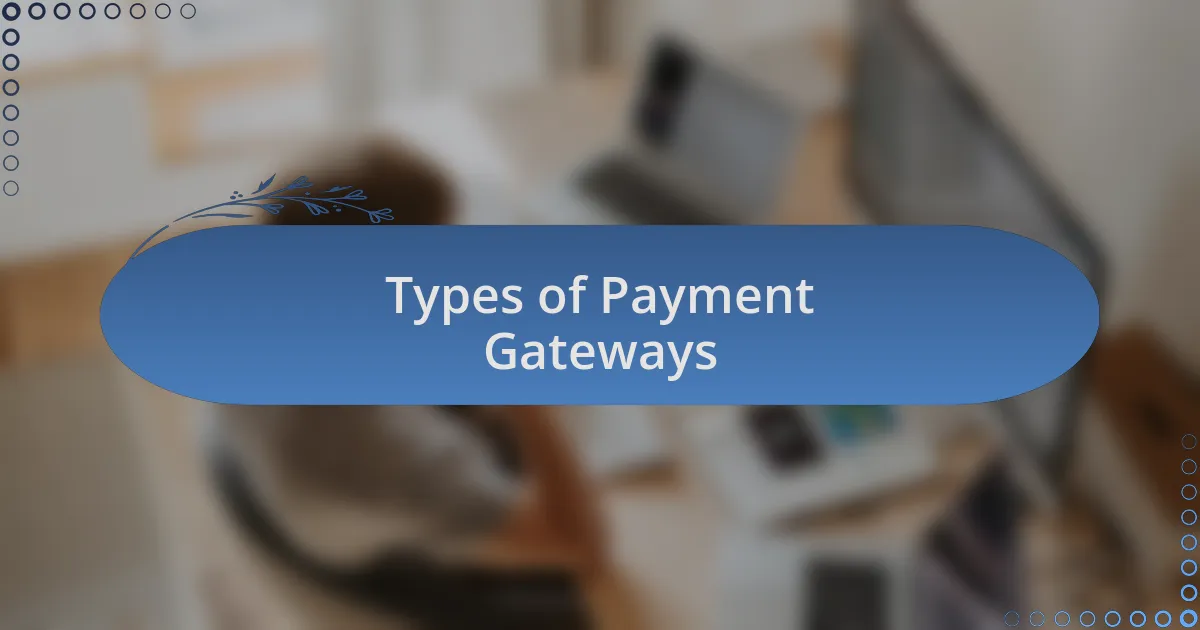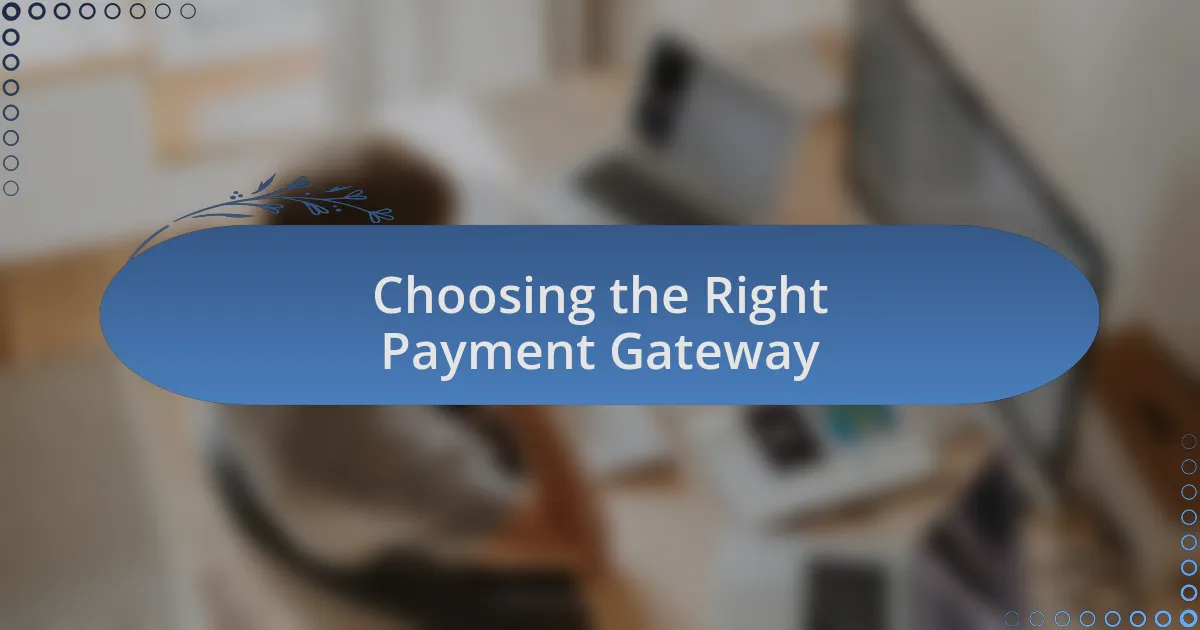Key takeaways:
- Payment gateways are essential for facilitating secure online transactions, acting as intermediaries between customers and merchants.
- Choosing the right payment gateway significantly impacts customer experience, trust, and overall business performance.
- Different types of payment gateways (hosted, self-hosted, and API-based) offer varied benefits regarding security, user experience, and customization.
- Key factors to consider when selecting a gateway include transaction fees, user experience, and security features, all of which affect customer satisfaction and retention.

Introduction to Payment Gateways
Payment gateways are the unsung heroes of e-commerce, silently facilitating transactions between customers and online merchants. I remember the first time I integrated a payment gateway for my own website; the sense of security it provided was unparalleled. It wasn’t just about processing payments; it was the assurance that came with knowing my users’ financial information was handled safely.
Imagine trying to complete an online purchase only to find out that the payment process is clunky or fails altogether. Frustrating, right? That’s where payment gateways shine by ensuring a smooth and seamless experience. They act as a bridge between the customer’s bank and the merchant’s bank, encrypting sensitive information to protect it from prying eyes—an aspect I’ve come to realize is vital in building trust with users.
In my experience, choosing the right payment gateway can significantly impact your business performance. Each option comes with its unique features, transaction fees, and payout processes that can either empower or hinder your online operations. Have you ever considered how a small change in payment processing can influence customer retention? I found that a well-chosen gateway not only makes transactions easier but also enhances the overall customer journey, ultimately leading to greater satisfaction and loyalty.

Definition of Payment Gateways
Payment gateways are essential tools that enable online transactions. They function as the intermediary between the customer’s payment method—such as credit or debit cards—and the merchant’s bank account. When I encountered the first payment gateway integration, I was amazed at how quickly and efficiently it processed transactions, almost like magic happening behind the scenes.
At its core, a payment gateway is responsible for securely capturing and transmitting transaction data. This means when a customer enters their card details, the gateway encrypts this sensitive information, ensuring it’s only accessible to the involved parties. Reflecting on my experiences, I recall the relief I felt knowing that the payment process was not just seamless but also secure, instilling confidence in both my business and my customers.
Understanding what a payment gateway does can transform the way you approach e-commerce. Have you ever wondered how online platforms maintain their credibility while handling payments? For me, it became clear that selecting a reliable payment gateway was non-negotiable. It wasn’t just about access to funds; it encompassed trust, security, and a professional standing within the competitive online marketplace.

Importance of Payment Gateways
The importance of payment gateways cannot be overstated. They serve as the backbone of online transactions, ensuring that both merchants and customers can engage with peace of mind. I still remember the first time a payment gateway’s failure led to a frustrating experience—not just for me but for my customers too. It was a harsh reminder of how crucial these systems are for maintaining trust in e-commerce.
Equally important is the role they play in fraud prevention. Payment gateways don’t just process payments; they come equipped with robust security features that detect and mitigate fraud attempts. I recall a situation where a suspicious transaction was flagged, allowing me to investigate and safeguard my business. That experience reinforced my understanding that an effective gateway is not merely a convenience; it’s an essential shield against potential financial loss.
Additionally, choosing the right payment gateway can significantly impact customer experience. A smooth checkout process can mean the difference between completed sales and abandoned carts. I often think about how many customers I lost in the early days simply because my payment process was clunky. Now, I make sure to prioritize user-friendly gateways, knowing they can directly affect my bottom line.

Types of Payment Gateways
When exploring types of payment gateways, I find it fascinating to see how they can be categorized into different models. The most common are hosted gateways, where the customer is redirected to a third-party site to complete the payment. I remember pondering how this option made me feel secure, thinking about the added layer of safety while letting a reliable service handle sensitive information.
In contrast, self-hosted gateways allow customers to make payments directly on the merchant’s site. This was a game-changer for me; implementing it transformed my checkout experience. I can still recall the delight in my customers’ voices when they noted how seamless the payment process felt—no redirects, just a smooth transition from shopping to checkout.
Lastly, there are API-based gateways, which offer the flexibility of integrating payment processing directly into a website. While I initially hesitated, because of the technical know-how required, my experience proved rewarding. The customization options meant I could tailor the payment experience to fit my brand, ultimately leading to more satisfied customers. Have you experienced that thrill of making a payment process uniquely yours? It’s a rewarding journey!

Choosing the Right Payment Gateway
When choosing the right payment gateway, I believe it’s crucial to consider transaction fees. I remember the first time I launched an online store; those extra costs added up quickly, and I wished I had researched this aspect more thoroughly. It’s essential to analyze not only the fees but also how they impact your overall pricing strategy. Have you thought about how those costs can creep into your profit margins?
Another factor that often catches my attention is the user experience. I vividly recall the frustration I felt as a customer when a payment page was complicated and slow. It made me realize that a smooth, intuitive checkout process is vital for retaining customers. How does your current gateway handle this? Ensuring that your payment process reflects your brand’s values can significantly impact customer satisfaction and loyalty.
Don’t overlook the importance of security features. I once encountered a situation where a client’s payment gateway suffered a data breach, causing significant trust issues among their customers. That experience taught me the value of options like tokenization and PCI compliance. When you consider a payment gateway, ask yourself: does it prioritize security just as much as it does functionality? The peace of mind that comes from knowing your customers’ data is secure cannot be overstated.

My Experience with Payment Gateways
Selecting a payment gateway can feel overwhelming, especially when you dive into the nitty-gritty of features. I remember once struggling with a gateway that promised the world but fell short during a high-traffic sales event. The panic of seeing customers drop off as the system lagged taught me the importance of reliability. Have you ever lost a sale because of a technical glitch? I sure have, and that moment underscored why seamless performance matters.
Another lesson I learned was about customer support. Early in my web development career, I faced an urgent issue with a payment processor right before a product launch. With little guidance available, the stress was palpable. It made me appreciate gateways with responsive customer service. When you’re in a bind, who you can call matters immensely. Have you considered what support looks like for your potential gateways?
Lastly, I’ve seen firsthand how integration capabilities can simplify life. During a recent project, I opted for a gateway that effortlessly connected to existing tools—what a game changer! The ease of syncing transactions with inventory management software significantly improved efficiency. Have you thought about how crucial compatibility may be for your operation? From my experience, a well-integrated system can truly elevate your business.